CARACAS — Venezuela will hold regional elections on November 21. This time around, “the people” will “elect” 3,082 men and women – split across the country’s 23 governor seats, 335 mayoral offices, and thousands of state legislators.
Both the socialist dictatorship and the socialist “opposition” are enthusiastically encouraging participation. For the average Venezuelan, however – who has lived through at least 28 rigged elections – why bother?
Under normal circumstances, democracy should be the way to solve our own affairs and bring much-needed change to the country, but that is impossible in Venezuela after 22 years of “Bolivarian Revolution” have left Venezuelans in a state of utter resignation, exhaustion, and stagnation. The Chinese coronavirus pandemic is the icing on the cake.
According to a poll run in July of 2021, 53 percent of Venezuela’s population says it is willing to participate in these upcoming elections. For comparison, nearly 70 percent of the electorate abstained from voting in 2020’s sham legislative elections according to the Venezuelan electoral authorities’ official data — or more than 80 percent according to the Venezuelan opposition’s data.
The total lack of will to vote aside, our Constitution stipulates that the government must hold elections. The Socialist Party has decided to respect this provision, for some reason, while ignoring nearly the entire rest of the document – most blatantly the part where our lawmakers can oust a president that breaks with the “democratic order,” like Nicolás Maduro has. Failure to hold rigged elections would go against the regime’s desire to project a democratic facade to the world.
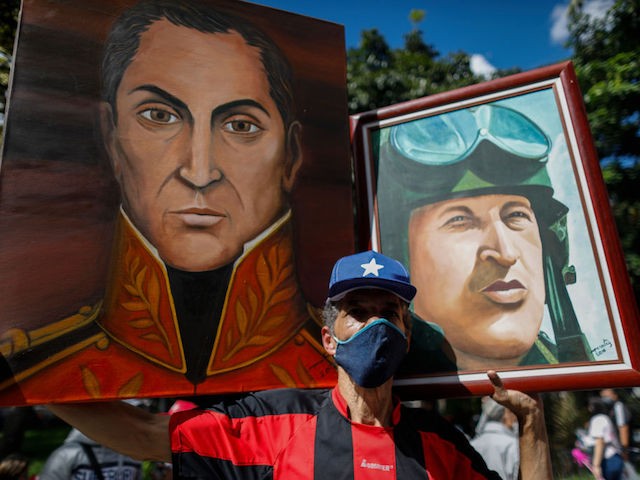
A supporter of dictator Nicolás Maduro holds on his back portraits of Simón Bolívar and Hugo Chavez during the rally in support of the Parliamentary Elections from Plaza Bolívar during the day that President Juan Guaidó calls his supporters to participate in the popular consultation on December 12, 2020 in Caracas, Venezuela. (Leonardo Fernandez Viloria/Getty Images)
Maduro hosting fake elections is not new, but the socialist “opposition’s” enthusiastic support for them is.
Henry Ramos Allup, of the Democratic Action party (a member of the Socialist International), defended the opposition’s participation after the opposition was unbanned from participating, ending a three-year boycott on Venezuela’s rigged electoral processes.
“We don’t have all the guarantees, but we will participate,” said Ramos Allup.
Interim President Juan Guaidó has not explicitly called for participation in these elections and has instead demanded guarantees for free and fair elections for these upcoming ones and for future presidential and legislative elections.
However, the political party that he was part of until 2020, Popular Will (also a member of the Socialist International), is among the participating parties in these upcoming elections. Leopoldo López, head of Popular Will living in exile, also supported the opposition’s participation as an “opportunity to fight.”
“These are not free elections,” he stated in an interview given to CNN en Español, backing Guaidó on his stance against the elections. Yet, as a Venezuelan voter, the support and call to participation in a sham election feels almost paradoxical.
Some opposition politicians have expressed their support in not participating in this upcoming sham. “Not voting in a dictatorship is also a right,” said opposition politician David Smolansky.
The fact that some exiled Venezuelan politicians have now returned — with the tacit blessing of the socialist regime — to participate in these sham elections does, in my opinion, a gross disservice to the approximately 7 million Venezuelans who have so far fled the country. Among those that have recently returned from their exile are Enzo Scarano, who seeks to win the Governor seat in the State of Carabobo; Américo de Grazia, who aspires to win Bolívar’s Governor seat; and Tomas Guanipa, former Ambassador for Guaidó’s government to Colombia who is running for mayor of Caracas.
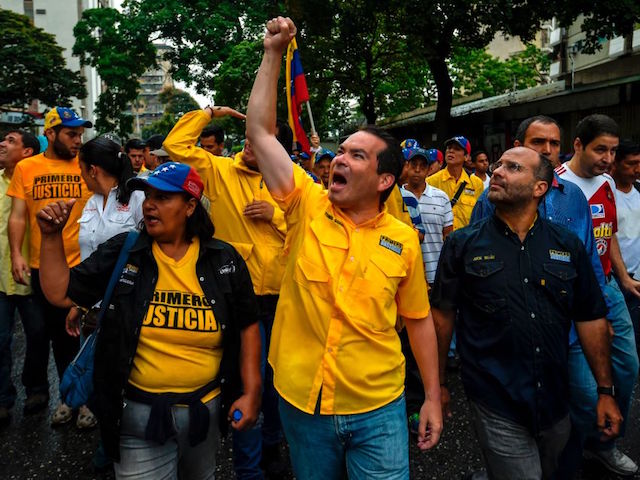
Venezuelan opposition lawmaker Tomas Guanipa (C) greets supporters during a protest against the government of Nicolas Maduro in Caracas on April 13, 2017. (JUAN BARRETO/AFP via Getty Images)
Guanipa is a notable case. In 2017, he won the race for the governor’s seat in the state of Zulia. Out of the five opposition governors who won in that election, he was the only one that did not agree to be sworn in by the socialist regime’s sham “National Constituent Assembly” and, as a result, he was stripped of his victory. During that time, he declared that the opposition should not participate in electoral processes without proper guarantees.
Having opposition figureheads now suddenly defend calling to participate in an electoral farce just because it suits their interests is something I cannot condone nor be part of. I’d rather just spend that day staring at my bedroom’s ceiling. It’s a better use of my time.
Opposition leaders have failed to address how they will ensure that the corrupt election system in this country will work. Venezuela’s electoral system is a paradox. On one hand, it has safety measures in place that, in theory, should amount to a robust, fool-proof, and transparent election – such as obligatory in-person voting on the day of the election and mandatory ID and fingerprint checks. Unlike the United States, there is no possibility to cast a vote via absentee or mail-in ballots. Additionally, there is on-site physical and digital auditing of each voting center before transmitting the data to the totalization center.
On the other hand, it is a corrupt system, with a stained and unreliable voter registry. Following the departure of international election technology company Smartmatic in 2017 after the regime tampered with its systems to ensure a victory, the regime uses Chinese-manufactured machines running proprietary Venezuelan software.
The Socialist Party rigs elections even when only socialists are on the ballot. Countless reports of glaring cheating and fraud surfaced this year during the regional primaries. Maduro’s thugs regularly intimidate “dissident” chavistas.
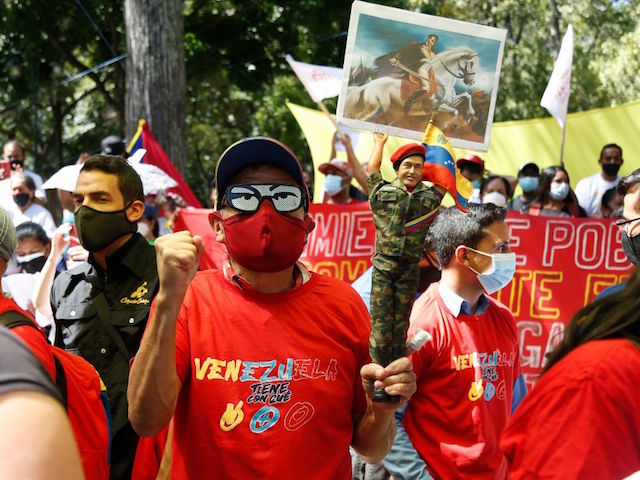
Members of social movements attend a rally with Venezuelan deputy and vice-president of the United Socialist Party of Venezuela (PSUV), Diosdado Cabello, at Carabobo Park in Caracas, on November 10, 2021. (PEDRO RANCES MATTEY/AFP via Getty Images)
Blatant voter coercion is another huge factor to consider, as public sector workers and beneficiaries of the socialist regime’s programs (housing, food handouts, or monetary stipends) face extreme pressure to vote for the socialist candidates in each election — to the point that citizens are threatened to not even receive opposition candidates in their areas, or face losing access to the regime’s CLAP food handouts. The threat is so ingrained that it’s even carried out during election rehearsal exercises through the use of “red points,” where participants must scan their Fatherland ID card once the voting rehearsal is carried out.
Election rehearsal, or simulacrum, is a routine activity that the Venezuelan Electoral Council organizes weeks before any election on specific voting centers to test their technological platform (including the fingerprint scanners), data transmission infrastructure, and to garner data pertaining to the voting process, such as the estimated voting time.
None of these are new phenomena in the country, and all of these (and more) were strong enough reasons to lead the Venezuelan opposition to boycott the 2020 legislative elections — and yet, the same opposition is now calling for its electorate to participate in next month’s elections, against the same socialist party, and under the same unfair and rigged scenario.
The European Union’s decision to send a group of observers, far from guaranteeing a fair election, only serves to further socialist dictator Nicolas Maduro’s agenda and gives a degree of legitimacy to an otherwise rigged process.
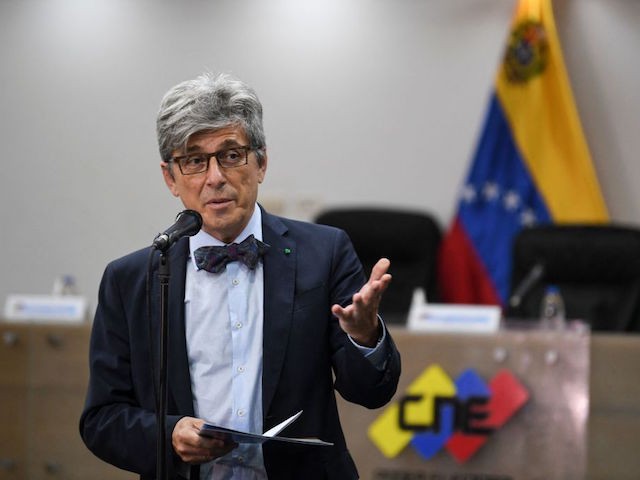
Spanish Rafael Dochao Moreno, Charge d’Affaires of the European Union (EU) in Venezuela, speaks during the signing of agreements for the observation mission ahead of the 2021 regional and municipal elections with the president of the Venezuelan National Electoral Council (CNE) Pedro Calzadilla (out of frame), in Caracas, on September 30, 2021. (YURI CORTEZ/AFP via Getty Images)
A rigged and apathetic election will come with zero surprises in its results. The United Socialist Party (PSUV) will sweep most of the seats. The opposition will certainly accrue a handful of victories here and there, especially on “bastions” such as the Chacao municipality in Caracas. Leftists and marxist ideologues all around the world will sing high praises of the “solid” Venezuelan electoral system. The socialist regime gets to further their “we are 100-percent democratic” narratives. Life will go on as usual in Venezuela.
Even if by some chance the opposition manages to obtain a sweeping victory, the regime will do everything and anything to minimize and/or outright neutralize these victories, just as they did with the opposition’s 2015 legislative victory.
The opposition’s participation, instead of an act of defiance, is an act of coexistence and collaborationism with the socialist regime. Ultimately, it doesn’t matter if the opposition snatches a governor’s seat or two. My birthplace, Zulia will continue to be plagued by constant power blackouts and electricity rationing. Water shortages will dictate many aspects of my life, Venezuela’s health infrastructure will continue to be in shambles, and children have no access to proper education.
Christian K. Caruzo is a Venezuelan writer and documents life under socialism. You can follow him on Twitter here.
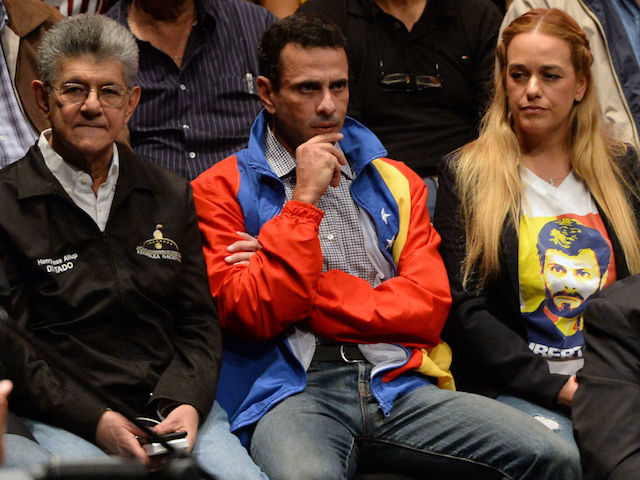
COMMENTS
Please let us know if you're having issues with commenting.